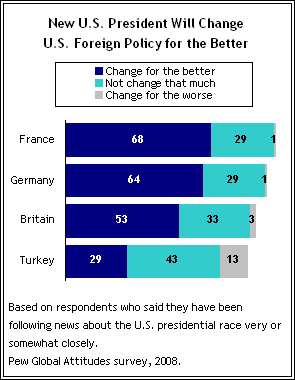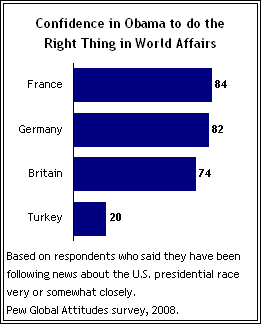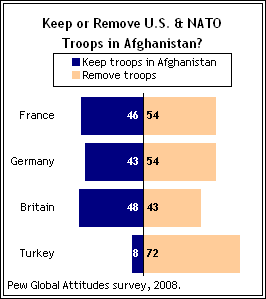By Erin Carriere-Kretschmer, Senior Research Associate, Pew Global Attitudes Project
On his first trip overseas, U.S. President Barack Obama intends to tackle the current global economic downturn and NATO commitments in Afghanistan, with stops in Britain, France, Germany, Czech Republic and Turkey. Public opinion polls suggest Obama may have reason to expect a mostly warm reception. In the spring 2008 Pew Global Attitudes survey, Western Europeans overwhelmingly expressed optimism about a post-Bush American foreign policy, and they voiced a great deal of confidence in Obama, who was in a battle for the Democratic presidential nomination at the time.
The 2008 survey found considerably more skepticism, however, in Turkey, where anti-American sentiments have become increasingly common in recent years. Relatively few Turks believed American foreign policy would improve with a new administration and fewer still expressed confidence in Obama.
However, even in the European nations where he has enjoyed sky-high ratings, the new president may face opposition to his calls for more NATO troops for Afghanistan and efforts to address the economic crisis. For instance, Europeans and Turks have generally expressed an interest in removing rather than keeping NATO troops in Afghanistan. In addition, when dealing with the economic crisis, Obama will confront the reality that even before the U.S. economic crisis metamorphosed into a global one, many Europeans blamed the U.S. for much of their own economic woes.
Anticipation of Change in U.S. Foreign Policy

While America’s image in Western Europe has deteriorated in recent years, in large part as the result of opposition to the Bush administration’s foreign policies, the 2008 Pew Global Attitudes Project found a widespread belief among Western Europeans that U.S. foreign policy would “change for the better” after the inauguration of a new American president. Among people who were following the election closely, large majorities in France (68%) and Germany (64%) and half in Britain (53%) said that they believe U.S. foreign policy would improve after the election.
In Turkey, however, only 29% expected a new U.S. president would change U.S. foreign policy for the better. The most common view among Turks was that the election of a new president would not bring much change to American foreign policy (43%). Just over one-in-ten Turks (13%) said that a new president would actually change U.S. foreign policy for the worse. Few in Western Europe felt the same way — just 1% in France and Germany, and 3% in Britain.
Confidence in Obama

As of spring 2008, European publics were not only optimistic about a post-Bush era U.S. foreign policy, but were clearly enthusiastic about the prospects for an Obama-led American foreign policy. Fully 84% of the French, 82% of the Germans and 74% of the British who were following the election said they had confidence in Obama to do the right thing in world affairs.
By contrast, only 20% of the Turks who were following the campaign also expressed confidence in Obama. Far fewer among these European and Turkish publics expressed confidence in Republican presidential candidate John McCain.
One of Obama’s initial foreign policy moves may have bolstered confidence in him in both Western Europe and Turkey. Shortly after arriving in office, Obama established a time-line for the removal of U.S. troops from Iraq, a policy move that reflected European and Turkish preferences. In spring 2007, large majorities of Turkish (86%), French (78%) and German (71%) publics and just half of the British (50%) already favored removal of U.S. troops from Iraq.
Concerns About Afghanistan

However, efforts by Obama at the NATO meetings in France and Germany to secure increased European troop commitments to NATO missions in Afghanistan may encounter opposition. In 2008, a large majority of Turks (72%) and more than half of Germans and French (54%) favored removing U.S. and NATO troops from Afghanistan as soon as possible. The British were largely divided on the issue (43% remove troops vs. 48% keep troops).
U.S. Economic Impact Viewed as Negative

Obama’s attempts to address the global economic crisis at the G-20 summit in London will likely also encounter some challenges given that many in Europe have recently characterized U.S. economic influence negatively.
In spring 2008, long before the current economic crisis evolved from a U.S. to a global one, nine-in-ten in Britain and Germany, and roughly eight-in-ten in France and Turkey said the U.S. economy had a great deal or fair amount of influence on their country’s economy. Seven-in-ten or more also viewed that impact as negative.




